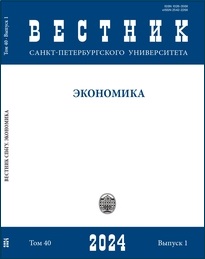Mechanisms for achieving decent wage in the Russian economy
DOI:
https://doi.org/10.21638/spbu05.2024.102Abstract
The article analyzes the new rules for setting minimum wage, introduced in 2020 in Russia in terms of how they contribute to achieving the decent wage in accordance with the current norms of international and Russian labour law. Minimum wage, while remaining a popular tool for regulating the wage floor, has undergone radical changes in 2020, which affected the basis for its calculation, the level and the frequency of its revision, as well as data sources. The completion of the first year cycles of the new rules for calculating the minimum wage and the stress test of 2022–2023 make it possible to assess the practice of their implementation. We assess the observed and projected effects of the new minimum wage methodology in relation to the norms of international documents (such as the Convention concerning the Minimum Wage of the International Labor Organization, the European Social Charter, the International
Covenant on Economic, Social and Cultural Rights, as well as the Charter of Social Rights and Guarantees of Citizens of Independent States). The article gives special attention to the milestones in the development of legislative regulation of the minimum wage in modern Russia. Basing on positive economic analysis, we conclude that the changes in the rules for calculating the minimum wage have reduced its sensitivity to inflation and broken the link with the costs necessary to maintain the reproduction of human capital of the employee and her household. In this research, we have confirmed the hypothesis that the new rules for calculating the minimum wage are poorly favorable to the implementation of decent work as one of the declared national development goals of the country for the period up to 2030. We propose alternatives
to reform the minimum wage in the direction of promoting the growth of real incomes of workers and members of their households. We stress the need to establish a stronger dialogue between the state and other stakeholders when developing effective solutions to achieve decent wages in terms of transformation of economy.
Keywords:
minimum wage; minimum wage setting; institutional framework, social policy priorities; labor law; decent wage; decent work.
Downloads
References
Бобков, В. Н., Гулюгина, А. А., Одинцова, Е. В. и Сафронова, А. М. (2019) ‘Социально приемлемая потребительская корзина’, Уровень жизни населения регионов России, 15, c. 8–26. https://doi.org/10.19181/1999-9836-2019-10060
Бобков, В. Н., Одинцова, Е. В. и Гулюгина, А. А. (2020) ‘Потребительская корзина как основа государственных гарантий минимальных денежных доходов российских граждан (часть вторая)’,Народонаселение, 23 (4), c. 4–18. https://doi.org/10.19181/population.2020.23.4.1
Вишневская, Н. Т. (2016) ‘Регионализация минимальных заработных плат’, Вопросы государственного и муниципального управления, 4, c. 27–44.
Коденцова, В. М., Вржесинская, О. А., Никитюк, Д. Б. и Тутельян, В. А. (2018) ‘Витаминная обеспеченность взрослого населения Российской Федерации: 1987–2017 гг.’, Вопросы питания, 87 (4), с. 62–68. https://doi.org/10.24411/0042-8833-2018-10043
Корнейчук, Б. (2021) ‘Новая методика расчета прожиточного минимума: проблемы теории и практики’, Экономическая политика, 16, c. 120–139. https://doi.org/10.18288/1994-5124 2021-6-120-139
Лищук, Е. Н. и Капелюк, С. Д. (2020) ‘Проблемы регулирования оплаты труда работников Крайнего Севера и приравненных к нему местностей’, Экономика региона, 16 (1), с. 97 -113. https://doi.org/10.17059/2020-1-8
Лукьянова, А. Л. (2018) ‘Минимальная заработная плата и минимальные заработные платы в России’, Журнал Новой экономической ассоциации, 1, с. 176–186. https://doi.org/10.31737/2221-2264-2018-37-1-8
Мачульская, Е. Е. (2021) ‘Модификация принципов трудового права в свете изменений Конституции Российской Федерации’, Трудовое право в России и за рубежом, 1 (2), с. 3–7.
Мигранова, Л. А. (2018) ‘Заработная плата в России и мире: сравнительный анализ’, Народонаселение, 21, с. 52–67. https://doi.org/10.26653/1561-7785-2018-21-3-04
Терентьева, О. Н. (2018) ‘Актуальные вопросы наполнения потребительской корзины среднестатистического россиянина’, Национальные интересы: приоритеты и безопасность, 14 (12),с. 2231–2243. https://doi.org/10.24891/ni.14.12.2231
Ajupov, A. A., Kurilova, A. A. and Efimova, E. A. (2015) ‘Setting the minimum wage in the Russian Federation regions’, Mediterranean Journal of Social Sciences, 6 (1), pp. 35–39. https://doi.org/10.5901/mjss.2015.v6n1s3p35
Boeri, T. (2012) ‘Setting the minimum wage’, Labour Economics, 19 (3), pp. 281–290.
Cantillon, B., Parolin, Z. and Collado, D. (2020) ‘A glass ceiling on poverty reduction? An empirical investigation into the structural constraints on minimum income protections’, Journal of European Social Policy, 30 (2), pp. 129–143.
Card, D. and Krueger, A. B. (1994) ‘Minimum wages and employment: A case study of the fast-food industry in New Jersey and Pennsylvania’, American Economic Review, 84 (4), pp. 772 793.
Dryzek, J. (1996) ‘The informal logic of institutional design’, in R. Goodin (ed.) The theory of institutional design (Theories of institutional design). Cambridge: Cambridge University Press, pp. 103–125. https://doi:10.1017/CBO9780511558320.005
Gimpelson, V. and Kapeliushnikov, R. (2013) ‘Labor market adjustment: is Russia different?’, in M. Alexeev and Sh. Weber (eds) The Oxford Handbook of the Russian Economy. https://doi.org/10.1093/oxfordhb/9780199759927.013.0012
Haapanala, H., Marx, I. and Parolin, Z. (2022) ‘Decent wage floors in Europe: Does the minimum wage directive get it right?’ IZA Discussion Paper, no. 15660. http://dx.doi.org/10.2139/ssrn.4263242. URL:https://docs.iza.org/dp15660.pdf. (дата обращения: 18.01.2024).
Kapelyuk, S. (2015) ‘The effect of minimum wage on poverty: Evidence from RLMS-HSE data’, Economics of Transition and Institutional Change, 23, pp. 389–423. https://doi.org/10.1111/ecot.12066
Lukiyanova, A. and Vishnevskaya, N. (2016) ‘Decentralisation of the minimum wage setting in Russia: Causes and consequences’, The Economic and Labour Relations Review, 27, pp. 98 117. https://doi.org/10.1177/1035304616629616
Lukiyanova, A. (2011) ‘Effects of minimum wages on the Russian wage distribution’. Higher School of Economics Research Paper, no. WP BRP 09/EC/2011. https://doi.org/10.2139/ssrn.2002938
Muravyev, A. and Oshchepkov, A. (2016) ‘The effect of doubling the minimum wage on employment: evidence from Russia’, IZA Journal of Labor and Development, 6. https://doi.org/10.1186/s40175-016-0051-0
Muravyev, A. and Oshchepkov, A. Y. (2013) ‘Minimum wages, unemployment and informality: Evidence from panel data on Russian regions’, IZA Discussion Paper, no. 7878. http://dx.doi.org/10.2139/ssrn.2377614
Downloads
Published
How to Cite
Issue
Section
License
Articles of the St Petersburg University Journal of Economic Studies are open access distributed under the terms of the License Agreement with Saint Petersburg State University, which permits to the authors unrestricted distribution and self-archiving free of charge.







